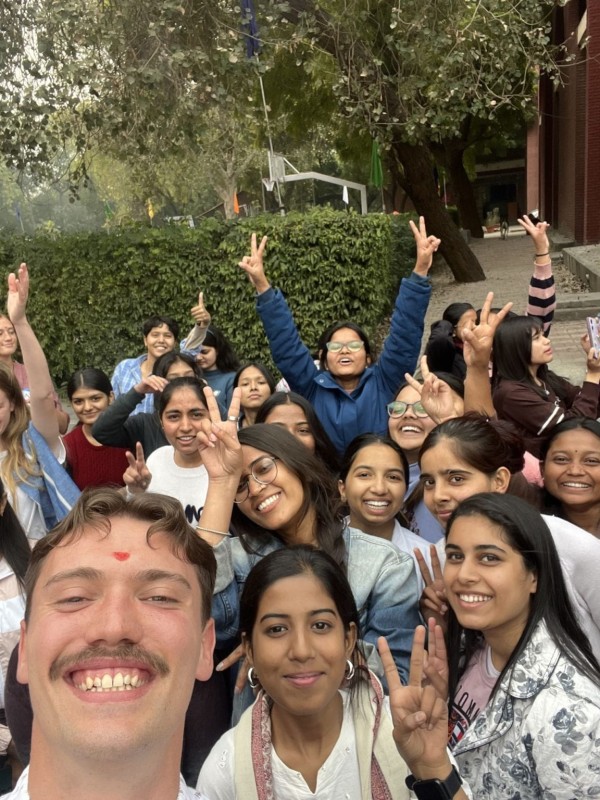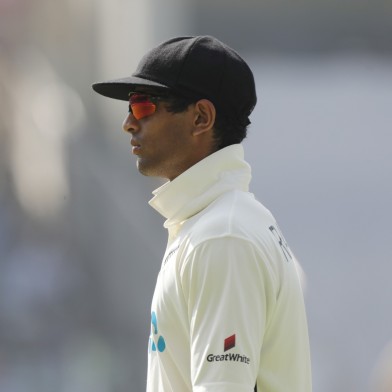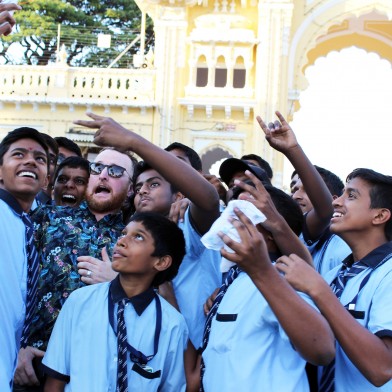When Sean Prenter was selected for the Prime Minister’s Scholarship to India (PMSA) he jumped at the opportunity to see Indian mythology hit the road. PMSA India is a six-week intensive tour of India where scholars visited a total of 12 cities from Pondicherry in the South to the foothills of the Himalayas in the North. Here, he reflects on his observations of disability within Indian culture and society.
India’s rich cultural heritage sees disability as a warrior queen and a revered sage. In the Rigveda, an Indian collection of hymns and poems written 3500BC-1800BC, Queen Vishpala loses her leg in battle and fights on with a prosthetic limb.
Ashtavakra, a Vedic sage, is said to have authored a central Hindu religious text the Ashtavakra Gita, triumphing over scholars in King Janaka’s court, who mocked his disabilities.

Sean Prenter (front left) travelled to India on a Prime Minister's Scholarship. Image: Supplied
Despite this mythology underpinning disability, India’s religious tradition has at times conceptualised disability as reincarnate sin. Hinduism sees people in a perpetual cycle of rebirth due to karma and as we heard locals say: “You play drama, you get karma”. Acting with or without virtue affects your next stage of the cycle until you reach moksha: transcendent release from the material cycle. Some have conceptualised disability as the output of poor karma.
How do these two warring ideas of disability play out in Indian society? At a government level, India has ratified the United Nations Convention on the Rights of Persons with Disabilities (UNCRPD), the central international treaty responding to the historic violation of disabled people’s rights and dignity.
As India moves towards realising the UNCRPD, the country has brought in the Rights of Persons with Disabilities Act. The legislation reserves 3 percent of all government jobs for individuals with disabilities and among other requirements, mandates accessibility across India.
This centralised approach strengthens institutions that are advancing disability inclusion. On tour, we visited Jaipur Foot, a leading prosthetics charity with 33 branches around the world. The charity provides prosthetics free of charge to those in need and so far, it has helped 2.1 million disabled people regain agency. In fact, the prosthetics are so functional that Sudha Chandran, a famous Indian dancer and actor, performs wearing the Jaipur Foot.
Further, Jaipur Foot advances government employment quotas by employing recipients to provide holistic support to customers adjusting to life with a new prosthetic.
India’s educational system seems to be following the government’s example. On our travels, we visited St. Joseph’s Jesuit University and Delhi University, both of which offer scholarships and use a quota for disabled students. For St Joseph’s, graduates have a 100 percent placement success and Delhi sees students employed mainly in the public service. Delhi also has a Disabled Student Council to guide disability inclusion and St Joseph’s a Disability Advisory Group.
India's approach to disability reflects a nuanced interplay between age-old mythology, contemporary legislation, and evolving societal norms. While Hindu teachings offer narratives of resilience and respect towards disability, entrenched beliefs tied to karma can sometimes perpetuate prejudice. However, amidst these intricacies, India preserves a level of communal interconnectedness reminiscent of pre-industrial times, fostering initiatives that prioritise inclusivity and empowerment.
From the implementation of the Rights of Persons with Disabilities Act to the transformative endeavours of institutions like Jaipur Foot, India showcases a dedication to bridging the divide between governmental, institutional, and communal responses to disability. India is gradually reshaping the landscape for its 70 million disabled citizens.
Author bio:
Disability is Sean’s specialty. He is serving his second term as Co-President for the National Disabled Students’ Association, studying a Masters in Politics, Philosophy and Economics. He also sits on many different boards and advisory groups to ensure accessibility, inclusion and dignity for our disabled whānau. Sean’s blogs explores the insights gained from networking with India’s industry leaders, NGO’s and fellow disability specialists in his travels. To read more about Sean’s travels in India see his blog posts.
- Asia Media Centre



